Imagine you are born inside a huge realistic movie set, from parents whose role was just to give birth by surrogacy and leave you, and from the first day of life till your adulthood, each step of your life is being recorded and telecast live; how would you feel when you find out that your whole life was a lie?
This is the story of Truman Burbank, played by Jim Carrey, arguably one of the craziest movie plots ever, where fiction is intertwined with practical life philosophy and teachings through symbols.
The use of symbolism in cinema is one of the greatest crafts and artistry in this industry. When a cinema focuses on symbolism, the plot of the cinema takes the backseat, and the narrative becomes the showrunner.
Even the use of light, shades, and camera angles, along with small aspects in the cinema setup, tell many things untold in the story.
While dissecting Truman Show, Peter Weir’s 1998 critically acclaimed flick, we’d better discuss the movie’s theme and symbolism than its technicality. Before that, let’s hear the story in short.
Truman Burbank has lived in a small town called Sea Heaven since childhood. He grew up there and had never experienced the world outside the town. As the story progresses, we see strange things happening, and Truman starts to doubt. In the climax, he finds out that his city, office, education, friends, wife, family - everything was a lie.
The first thing to notice from the film is surveillance. Like the famous line from George Orwell’s classic novel 1984 - “Big Brother is watching you,” the director of the show Christof was watching Truman’s whole life. It indicates how our lives have been under surveillance 24/7 through social media and other digital mechanisms, and we don’t even notice that we are being watched.
Our unconscious surrender is further indicated by Truman’s wife Meryl’s quote - “There is no difference between personal and social life.” When Truman’s friend Marlon said that he believed nothing in Truman’s life was controlled, we realise how false consciousness fabricated by media blinds us, exactly what Karl Marx said because Truman’s each and every step was controlled with strict monitoring.
Christof’s dialogue would suit the argument more - “We believe in whatever the media show us.”
You might wonder how the director could keep Truman confined in that town for so long. Why did he not try to go somewhere else? Well, the answer is fear, infiltrated by symbols.
You’ll notice a plane crash poster with the headline ‘It could happen to you!” frequently or a sunken boat in the jetty - both placed with the purpose of scaring Truman about a plane ride or voyage.
Whenever Truman wants to travel outside, the television starts playing the emotional song ‘Show me the way to go home,’ or Truman’s wife invites him to the bed or sometimes opens his personal photo album to make him nostalgic.
Even throughout the cinema, whenever Truman attempts to ask anything critical, his wife and friend tempt him with different products and amenities, symbolising a consumeristic society where our morality, thinking power, and will to explore are suppressed by consumeristic glamour.
Another perspective coming from this cinema is making media faces. When Christof failed to convince Truman to stay at Sea Heaven, he tried to tempt him by saying Truman was a hero and inspiration to millions, which clearly was a partial truth. Truman was indeed a media-made star and a money-making machine that made a profit for Christof ruining millions of hours of productive time of the audience.
Another fine allegory came from one scene when Meryl showed Truman their family album. An otherwise clean and fine picture had proof of how his wife cheated him when he looked into it with a magnifying glass. This signifies that whatever we see is not always true, and we must observe closely to find the anomalies.
In the end, Truman discovers the truth overcoming every Christof antic that aimed to suppress it. When Truman sings The Irish Rovers’ “What shall we do with a drunken sailor” while fighting with the big waves created artificially in the set, it gives the audience goosebumps, a taste of thrilling victory and freedom.
In the end, Truman steps out of the Sea Heaven sets and bids adieu to his false life - “In case I don’t see you, good afternoon, good evening, and good night!”


